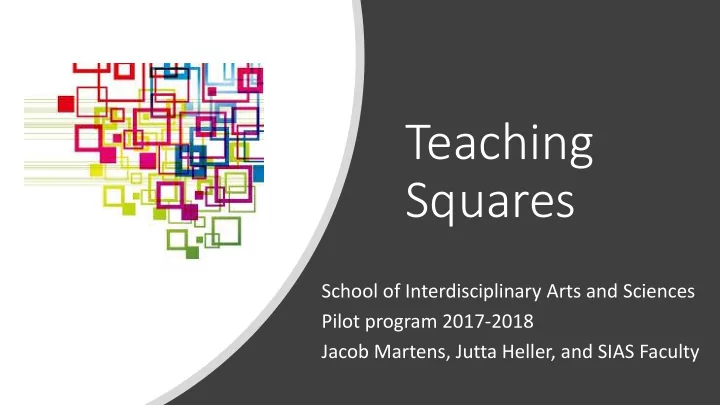

Teaching Squares School of Interdisciplinary Arts and Sciences Pilot program 2017-2018 Jacob Martens, Jutta Heller, and SIAS Faculty
Introductions • Who are we and what brings us here? • Jacob Martens and Jutta Heller • "Improving Teaching Evaluations at UWT" May 9th, 2017 By Teaching Evaluation Campus Fellows- Kim Davenport, Ehsan Feroz, Linda Ishem, Tom Koontz, and Sushil Oswal • Who are you and what brings you here?
Why? • Re-energize one's teaching • Reflect on one's own teaching practices • Share cross-disciplinary pedagogical perspectives • Build a community • Create collaborative connections with faculty members in other disciplines • Nurture and support ideas for scholarship in teaching and learning
Fall 2017 Winter 2018 Spring 2018 From CAC From CAC From SAM LeAnne Laux-Bachand LeAnne Laux-Bachand Joan Bleecker Jacob Martens Jacob Martens Heather Heinz Andrea Modarres Kimberly McClure Ellen Moore Olga Shatunova From SAM Haley Skipper From SAM Emily Cilli-Turner Duong(Rita) Than Karen Cowgill Brian Heaven Jeffrey Zirul Thanks Jeremy Davis Jutta Heller Jutta Heller Heather Heinz Meg Henderson Meg Henderson From SBHS to all! Marc Nahmani Shubha Rajopadhye Rose Njoroge Jenny Quinn Haley Skipper Jack Vincent From SHS From SHS Lauren Wugalter Danica Miller Cynthia Howson From SBHS and SHS Leighann Chaffee Will Burghart Cynthia Howson
How do Teaching Squares typically work? • 4 members in the square • 3 observations, ideally for the entire period, all completed within a 2-3 week period • 2 meetings with larger group (pre and post observations) • 1 meeting with the square • 0 judgments or evaluation letters
Our Pilot Adaptations: • 3-4 members in the square • 2-3 observations, at least an hour each, all completed between the 3rd and 9th weeks of the term • 1 meeting with the larger group • 1 meeting with the square or individual meetings with observation partners as available • 0 judgments or evaluation letters (unless you make separate arrangements) • The Kudos
How we can improve: • 4 members in the square • 3 observations, ideally for the entire period, all completed within a 2-3 week period • 2 meetings with larger group (pre and post observations) • 1 meeting with the square • 0 judgments or evaluation letters • Keep and expand the Kudos collection
What people had to say about Teaching Squares • "I came away with a newfound respect for the varied fields and disciplines our students navigate every day." A. Modarres • "I was reminded of all the different ways students can look and be engaged with course material" L. Laux-Bachand • "While teaching squares is not an evaluative process it does encourage me to self- evaluate, and improve.” H. Heinz • "The realities of group dynamics are crucial and having time to just observe them (without other obligations) helps me think about managing them better." C. Howson • "I really experienced group dynamics as a student, which is insanely powerful." C. Howson
What people wrote about in the Kudos as examples of effective pedagogies • Effective use of technology • Metacognition and study skills • Active learning and engagement • Effective group work • Building trust and community • Teaching information literacy and citing sources
How Teaching Squares improved our teaching • Jeremy Davis: I implemented random call for low-stakes questions like reading and interpreting a graph, to help students acclimate to talking in the class. • Rita Than: I learned that after asking a question, I should wait a little longer for students to respond. • Jutta Heller: I started implementing LeAnne Laux- Bachand’s practice of having students read out loud from slides as a low-stakes method of getting them to speak up in class. That has worked really well. • Jacob Martens: Teaching Squares helps me calibrate my teaching and think about how to best prepare my first-year students to succeed. It is also a helpful tool to focus on all the good work we strive to do together.
Moving forward...for discussion • Should Teaching Squares connect to our formal peer evaluations? • What should people look for in a cross-disciplinary observation? • Should we incentivize Teaching Squares? • Time to look at kudos and ask... • Should we continue to curate Kudos? Are they evaluations? • Comments/questions from you
Interested? What to do next • Join us: Teaching Squares celebration on June 7, 12:30-2 pm (GWP 320) • Sign up for the fall quarter online today or by the first week of classes in September and get ready for... • 4 members in the square • 3 observations, ideally for the entire period, all completed within a two to three week period • 2 meetings with larger group (pre and post observations) • 1 meeting with the square https://tinyurl.com/ • 0 judgments or evaluation letters • And lots of Kudos y763eyem
Recommend
More recommend